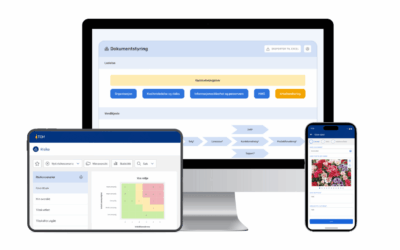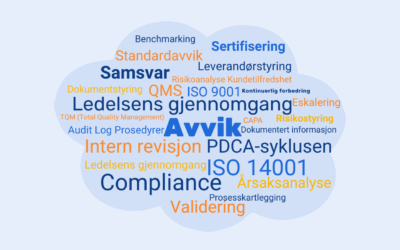Effektiv hendelsesrapportering i renovasjonsbransjen med TQM

Slik forbedrer du kvalitet, sikkerhet og bærekraft
La oss utforske noen av utfordringene med hendelsesrapportering i renovasjonsbransjen:
Utfordring 1: Kvalitetskontroll i avfallshåndteringen
En av de mest presserende utfordringene i renovasjonsbransjen er å sikre at avfallsbehandlingen følger strenge kvalitetsstandarder. Uansett om det dreier seg om innsamling av husholdningsavfall eller farlig avfall, er kvaliteten avgjørende. Enhver kvalitetsavvik kan føre til miljøproblemer, lovovertredelser og skade på omdømmet til renovasjonsselskapet.
Utfordring 2: Sikkerhetshendelser og ulykker
Utfordring 3: Kundeklager og avvik
Kunder kan rapportere avvik knyttet til tjenestekvaliteten, som forsinket avfallshenting, feil i fakturering eller feilbehandling av avfall. Disse klagene kan påvirke kundetilfredsheten og omdømmet til renovasjonsselskapet.
Utfordring 4: Overholdelse av regelverk og miljøhensyn
Renovasjonsbransjen er underlagt strenge regelverk knyttet til miljøvern og sikkerhet. Å overholde disse regelverkene er ikke bare viktig for å unngå bøter og rettslige konsekvenser, men også for å ivareta miljøet.
Utfordring 5: Dokumentasjon og rapportering
Utfordring 6: Opplæring og bevissthet
Utfordring 7: Kontinuerlig forbedring
Hendelsesrapportering gjennom Total Quality Management (TQM) har vist seg å være et effektivt verktøy for å møte utfordringene i renovasjonsbransjen og fremme bærekraftige praksiser. Ved å etablere klare prosedyrer, fremme en kultur for kontinuerlig forbedring og bruke data til å identifisere trender, kan selskaper sikre at:
- Avfallsbehandlingen holder høy kvalitet
- Sikkerheten på arbeidsplassen ivaretas
- Miljøpåvirkningen reduseres
- Regelverk etterleves
- Kundetilfredshet opprettholdes
TQM gjør det mulig for renovasjonsselskaper å levere tjenester som møter både kundens behov og samfunnets forventninger.
Vil du vite mer?
Last ned vår guide og få innsikt i hvordan TQM kan hjelpe deg med å håndtere hendelsesrapportering i renovasjonsbransjen.
Relaterte innlegg
Slik lykkes du med hendelseshåndtering
Helse, miljø og sikkerhet (HMS) er en sentral del av enhver virksomhet – uavhengig av bransje. En av de viktigste komponentene i HMS-arbeidet...
Dette er nytt i 4human TQM
Dette er nytt i 4human TQM 2025 Vi har gleden av å presentere en rekke spennende nyheter og forbedringer i 4human TQM! Denne oppdateringen byr på...
QMS-ordliste
Her er begreper og forkortelser du bør kjenne til dersom du jobber med kvalitetssystemer (QMS) – enten du er ny i rollen eller...


